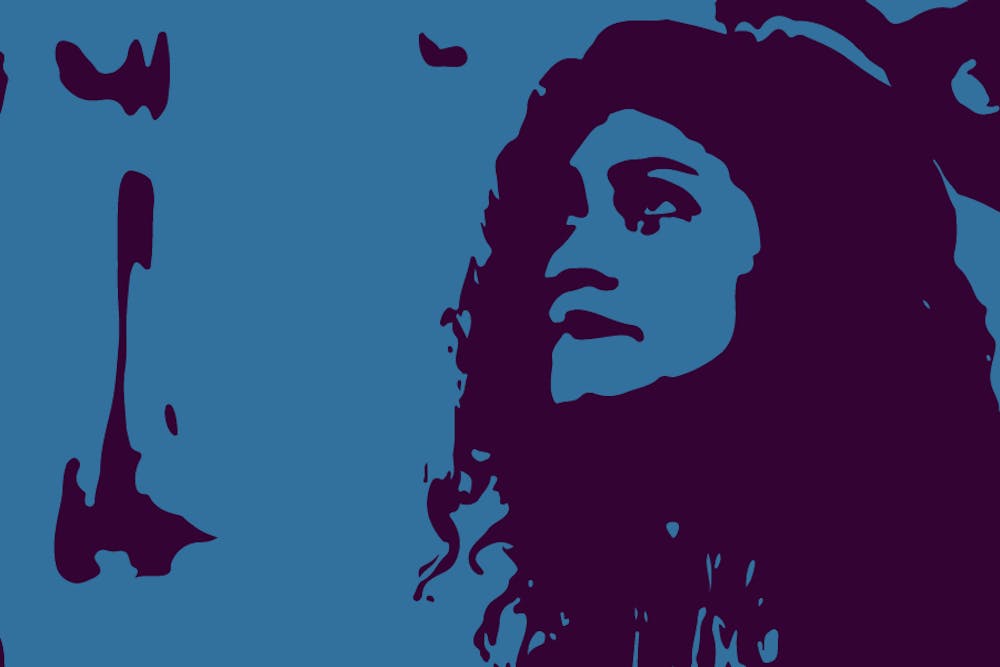Aesthetics, aesthetics, aesthetics. It's one of the first words that comes to mind when we talk about what makes HBO's Euphoria unique. That, alongside "glitter," "skimpy outfits," "graphic eyeliner," "drugs," and "partying." Anyone wearing an I.AM.GIA set, rhinestone makeup, or fun hairstyles is now said to have a Euphoria aesthetic. We toss the word around, loosely understanding it as embodying the style of a given piece of media or work of art, but formally, aesthetics is actually a philosophical discipline: the study of beauty and taste.
Aesthetics, specifically Black aesthetics and queer aesthetics, is concerned with questions that ultimately seek to interrogate a historically Eurocentric, heteronormative view of the world. Through whose eyes do we see the world? What does cultural production that centers Blackness and queerness look like? More loosely conceived, artistic perspective is another way of thinking about questions of worldview. To think of the bright colors, revealing ensembles, and rampant drug use, all viewed with a queer, biracial young woman’s point of view, it becomes clear that Euphoria’s aesthetics attempt to subvert glamorized assumptions about high school culture.
The TV series is often narrated from the perspective of Zendaya's Rue, a queer, Black teen recently out of rehab but with no intention of quitting drugs. The showrunner of Euphoria, Sam Levinson, has stated that Rue is an unreliable narrator and that her narrative is not always accurate in her retelling of things, especially as she is not always physically present for the scenes she recounts. According to Levinson, speaking about Rue’s special Christmas episode, "[Rue] is limited in her ability to understand the other emotional worlds of other characters, and it leaves open the other side of the story."
What can be gained from such a skewed perception? How does Rue's unreliability illustrate how we project our own perspective on our relationships with others?
Euphoria’s “Out of Touch,” the second episode of the show's second season, opens with Rue narrating Nate’s rumination on his love for his hookup Cassie, his ex–girlfriend Maddy, and his father. Jacob Elordi, who plays Nate, explained Nate’s interest in Cassie to Decider: “I think in Cassie, there’s something of this perfect life, this white picket fence, motorhome in the driveway, just American dream kind of thing.” He added: Cassie represents everything Maddy is not, and yet, he still can’t let go of Maddy. We're also witness to a scene where Dominic Fike's newly–added Elliot and Rue dance as they do drugs—an almost direct parallel to a scene in season one where Rue, high, dances with her father before he dies. As Rue and Elliot take turns putting their noses to a rolled–up dollar bill, Gerry Rafferty’s “Right Down the Line” plays. "This is my way of telling you everything / I could never say before."
Again, how Rue has any authority over or knowledge of Nate’s tortured relationship to intimacy, pleasure, and pain is suspect because she isn’t present for the experiences he recounts. This unreliability allows the story to be that much more exaggerated, to the point that we don’t know if any of these events are even occurring at all. Perhaps we are viewing some version of reality skewed to the aesthetic of Rue’s high mind, or maybe she is projecting her own definitions of love onto Nate’s reality. But, on her way to her Narcotics Anonymous meeting, Rue bikes past Nate kissing Cassie, a moment that quickly but directly juxtaposes the characters’ parallel navigation of love, addiction, and loss. In linking two seemingly out of touch perspectives, Nate’s white, hypermasculine persona and Rue’s Black, tomboy, lesbian one, the episode highlights the complicated nature of identity as it relates to perspective while allowing Rue, a self–proclaimed “deeply shy person,” to share her story in an almost limitless way, free from the confines of being factual.
Reflecting on this theme of (dis)connection and aesthetics, Penn’s own culture comes to mind. “Penn face,” “the party Ivy,” and the infamous “work hard, play hard” mentality illustrate how identity and culture are influenced by perspective. When you think about the basement of Van Pelt, Pool Party, on–campus recruitment, and even Smokes', these are markers of the Penn experience that concoct the idealized Penn student image. Girls wear tiny crop tops and baggy pants to parties, and expensive coats and leisurewear to class. There is clearly a "Penn Student" that is socially and institutionally perpetuated but, at the same time, we also know that there is no one identity all students fit into. Perhaps, as illustrated in Euphoria, skewing white–washed perceptions of identity allows complex connections to be drawn between seemingly dissimilar identities. It’s worth considering, at least, why so many people are drawn to Rue’s perspective, with the season two premiere drawing a record–breaking 2.4 million viewers, and what that says about the importance of a queer, Black, female character’s voice.

